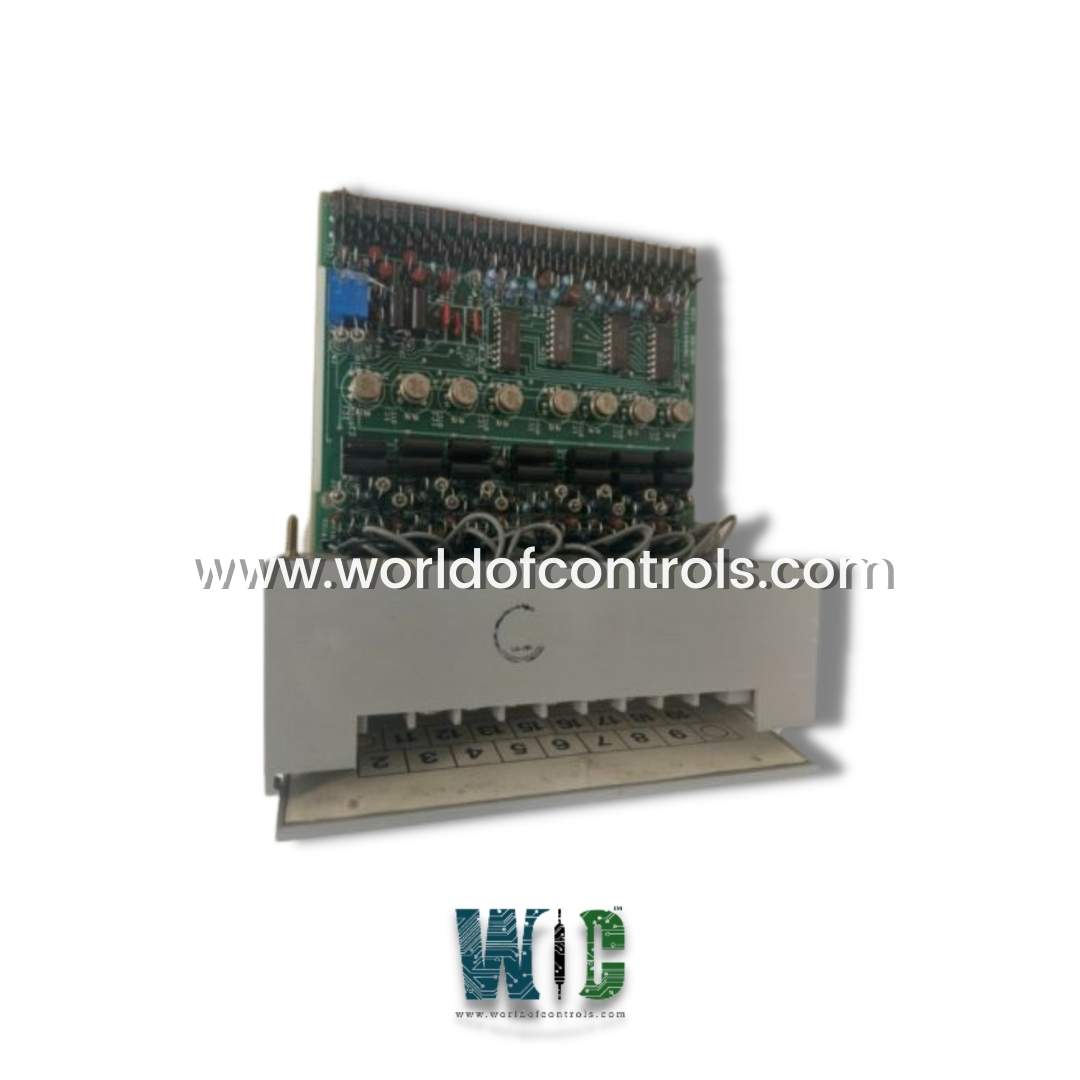
World Of Controls understands the criticality of your requirement and works towards reducing the lead time as much as possible.
IC3606ATCB - Thermocouple Conditioning Card is available in stock which ships the same day.
IC3606ATCB - Thermocouple Conditioning Card comes in UNUSED as well as REBUILT condition.
To avail our best deals for IC3606ATCB - Thermocouple Conditioning Card, contact us and we will get back to you within 24 hours.
SPECIFICATIONS:
Part Number: IC3606ATCB
Manufacturer: General Electric
Series: Mark I & II
Product Type: Thermocouple Conditioning Card
Number of Jumper Pins: 8
Power Supply Voltage: 28 V dc
Technology: Surface Mount
Operating Temperature: -40 to +70°C
Size: 15.9 cm high x 17.8 cm wide
Weight: 0.5 kg
Repair Time: 3-7 Days
Availability: In Stock
Country of Origin: United States
FUNCTIONAL DESCRIPTION:
IC3606ATCB is a Thermocouple Conditioning Card manufactured and designed by General Electric as part of the Mark I & II Series used in GE Speedtronic Turbine Control Systems. A Thermocouple Conditioning Card is a specialized electronic module designed to process and refine signals from thermocouples, which are sensors used to measure temperature. Thermocouple signals, typically in the millivolt range, require amplification and conditioning to be suitable for accurate measurement and integration into data acquisition or control systems. The card performs several key functions, including signal amplification, noise filtering, and linearization to convert the nonlinear thermocouple output into a precise temperature reading. Additionally, it incorporates cold junction compensation (CJC) to correct for temperature variations at the connection point where the thermocouple wires meet the conditioning card. These cards are vital in various industrial and scientific applications, such as process control, laboratory instrumentation, and automotive testing, where precise and reliable temperature monitoring is crucial.
FUNCTIONS:
Signal Amplification: Thermocouples produce a shallow voltage signal, often in the millivolt range, which is too small to be directly used in most measurement and control systems. The conditioning card amplifies this signal to a higher, more manageable level, making it suitable for precise temperature measurement. This amplification is crucial for maintaining the integrity of the signal, especially in environments with electrical noise or long cable runs.
Cold Junction Compensation (CJC): Thermocouples measure the difference in temperature between the sensing junction and the reference junction (usually where the thermocouple wires connect to the conditioning card). Since the reference junction is typically at a different temperature than the sensor, the card must compensate for this difference to provide an accurate reading of the actual temperature at the sensor. The CJC function corrects the output by accounting for the temperature at the cold junction, ensuring that the final temperature reading reflects the true temperature at the measurement point.
Filtering: In industrial environments, thermocouple signals can be affected by electrical noise, such as interference from machinery or other electronic devices. The conditioning card includes filtering circuits that help to remove this noise, stabilizing the signal and improving the accuracy of the temperature measurement. Filtering is particularly important in maintaining the quality of the signal over long distances and in environments with significant electromagnetic interference (EMI).
Linearization: The output of a thermocouple is not directly proportional to the temperature it measures; instead, it follows a nonlinear relationship. To convert this nonlinear output into a linear signal that can be easily interpreted by control systems or data acquisition devices, the conditioning card applies linearization algorithms. This function ensures that the temperature readings are accurate and can be directly correlated with the actual temperature, simplifying the integration of thermocouples into various systems.
Multiplexing: Some Thermocouple Conditioning Cards are designed to handle multiple thermocouple inputs simultaneously. This capability, known as multiplexing, allows for the monitoring of temperatures at several locations with a single card. The card sequentially samples the signals from each thermocouple, conditioning each one in turn. This function is particularly useful in complex systems where multiple temperature measurements are needed, such as in large industrial processes or multi-zone temperature control applications.
Output Conversion: After conditioning, the thermocouple signal needs to be converted into a format that can be easily utilized by the system it’s connected to. The card can output the conditioned signal in various formats, such as analog voltage, current (e.g., 4-20 mA), or digital signals (e.g., Modbus, CAN). This flexibility allows the thermocouple conditioning card to interface with a wide range of data acquisition systems, PLCs (Programmable Logic Controllers), and other control devices, making it adaptable to different industrial and scientific applications.
WOC has the largest stock of OEM replacement parts for GE Speedtronic Control Systems. We can also repair your faulty boards and supply unused and rebuilt boards backed up with a warranty. Our team of experts is available round the clock to support your OEM needs. Our team of experts at WOC is happy to assist you with any of your automation requirements. For pricing and availability on parts and repairs, kindly contact our team by phone or email.
Why do I need a Thermocouple Conditioning Card?
Thermocouples produce low-voltage, nonlinear signals that are sensitive to noise and temperature variations at the connection point. A conditioning card amplifies these signals, filters out noise, compensates for temperature differences, and linearizes the output, ensuring accurate and reliable temperature readings.
What types of thermocouples can be used with a Thermocouple Conditioning Card?
Most Thermocouple Conditioning Cards are compatible with a variety of thermocouple types, such as Type J, K, T, E, N, R, S, and B. The card may need to be configured or selected based on the specific thermocouple type you are using.
What is Cold Junction Compensation (CJC), and why is it important?
Cold Junction Compensation (CJC) corrects the temperature reading by accounting for the temperature at the junction where the thermocouple connects to the conditioning card. This is crucial because thermocouples measure temperature differences, and without CJC, the readings could be inaccurate.